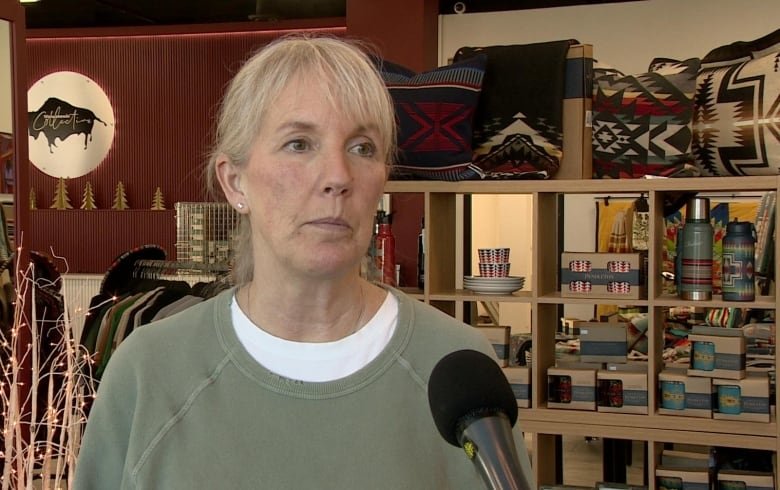As the Canada Post strike drags on, some businesses in rural areas say they’re being left without an essential service to many.
Dan Driediger runs GoTrekkers, a map business. He prints and sells thousands of nautical maps, charts and guidebooks across the world every year from his home in Missinipe, Sask., a small community more than 400 kilometres north of Saskatoon.
Before the strike, he would drive about 80 kilometres to La Ronge to mail his products to customers, but that’s not an option right now.
“I’m in trouble,” said Driediger. “I can hang on for a while, but I don’t know what the future holds. I’m really hoping that this strike ends soon, and I was really hoping for a good Christmas season — but with this strike on I’m not sure.”
He’s lost 70 per cent of his business since the postal strike by more than 55,000 workers with the Canadian Union of Postal Workers began on Nov. 15. Now he worries the other 30 per cent might cancel their orders as well.

He’s got about $2,000 worth of orders waiting to be shipped.
Driediger says it would cost him about $70 to have a courier send the same package he can usually send through Canada Post for about $3.
Those lower shipping rates “[make] my business viable,” he said. Without that, “I can’t run this business.… I don’t have any income.”
On top of that, the nearest courier businesses are in Saskatoon, hundreds of kilometres away.
“I have no other viable options, other than Canada Post. And so I wait,” said Driediger.
Canada Post’s strike is dragging on, leaving businesses in rural and remote areas without a way to ship out products. A man who runs a map-making company in northern Saskatchewan says business is down about 70 per cent. He says the strike needs to come to an end or businesses like his will close.
Mediation talks suspended
On Wednesday, a federally appointed special mediator decided to temporarily suspend talks between Canada Post and the union representing striking workers, with the federal labour minister saying the sides “remain too far apart on critical issues for mediation to be successful at this time.”
Binding arbitration is not an option right now, Labour Minister Steven MacKinnon said Wednesday.
Speaking to CBC Radio’s Blue Sky on Thursday, Brahm Enslin, president of CUPW Saskatoon Local 824, said the union wants to see wage improvements to keep up with the cost of living, better health and safety provisions, and better benefits for employees.
Enslin also reacted to news Thursday that Canada Post has been laying off some striking employees.
He pointed to a section of the Canada Labour Code that forbids employers from laying off workers participating in a strike.
“It’s something that it seems to be done to try to strong-arm an agreement from the members and to divide people from within,” Enslin said.
“It is really unfortunate, but … I can confirm there have been some terminations and some layoffs.”

Canada Post spokeswoman Lisa Liu confirmed the layoffs to CBC News, saying the corporation has informed employees that the collective agreements are no longer in effect and their conditions of employment have now changed, as per the Canada Labour Code — referring to a different section of the code that covers lockout notices.
While CUPW is asking for a 22 per cent wage increase over the next four years, Canada Post has offered half that.
In a statement Thursday, Canada Post said it’s looking to modernize its services and address financial losses, while minimizing fixed cost increases.
Rural, small businesses hit hard: CFIB
The timing of the strike couldn’t be worse for most businesses, but small and rural businesses are suffering the most, says Jasmin Guénette, vice-president for national affairs with the Canadian Federation of Independent Business.
“In large urban communities, often small businesses will find alternatives to Canada Post services. Those alternative services are generally much more expensive, but at least they exist,” he said.
But in rural communities, Canada Post is often the only available mail service.
Many small businesses will be losing out on important sales this week, with Black Friday, Small Business Saturday and Cyber Monday usually being big drivers, said Guénette.
Shari Bedient owns the Wanuskewin Gift Shop in Saskatoon, where she can access courier services. That’s comparatively expensive, but the shop has been taking on the extra cost, she said.

In addition to affecting the store’s ability to ship orders to customers, the strike has reduced its holiday stock. Artists who supply the store are struggling as well, Bedient said.
Local artists can still bring their products to the store, “but I just received a package from one of our artists that lives out in B.C., and his shipment was over a month late,” she said.
Saskatchewan nature photographer Jason Leo Bantle says he’s also feeling a hit from strike. Almost 70 per cent of his business is online, and Christmas is usually the biggest time of the year for sales.
“Can everyone call Canada Post and please tell them to settle? Because as a small business owner, it’s impacting us hugely,” he told Blue Sky earlier this week.
“The costs of shipping packages are going up 30 to 40 per cent, which means our profits are dwindling to zero. It’s hard on a small business.”



